dis-, di-, dif-
(Latin: separation, apart, asunder; removal, away, from; negation, deprivation, undoing, reversal, utterly, completely; in different directions)
The meaning of dis- varies with different words; dif-, assimilated form of dis- before f; di-, form of dis- before b, d, g, l, m, n, r, and v.
dissimulate (verb), dissimulates; dissimulated; dissimulating
1. To disguise, or to hide, true feelings, thoughts, or intentions from other people: Henry was lying in bed and dissimulated sleeping when his mother looked in to see if he was all right, although he was still wide awake.
2. To disguise one's intentions with a false appearance: Rebecca didn’t try to dissimulate her determination of talking with her principal about a boy in the class talking about having sex with her.
3. To conceal one's true motives, thoughts, etc., by some pretense; that is, to speak, or to act, hypocritically: James dissimulated as he pretended to be Linda’s friend, but he only wanted to copy her homework, since she was a very good mathematician.
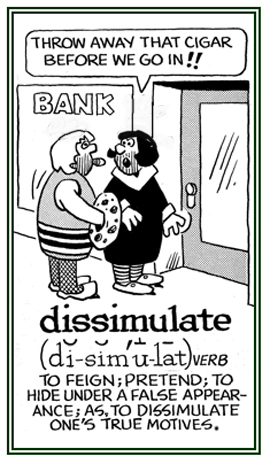
© ALL rights are reserved.
Go to this Word A Day Revisited Index
2. To disguise one's intentions with a false appearance: Rebecca didn’t try to dissimulate her determination of talking with her principal about a boy in the class talking about having sex with her.
3. To conceal one's true motives, thoughts, etc., by some pretense; that is, to speak, or to act, hypocritically: James dissimulated as he pretended to be Linda’s friend, but he only wanted to copy her homework, since she was a very good mathematician.

Go to this Word A Day Revisited Index
so you can see more of Mickey Bach's cartoons.
1. The process of hiding under a false appearance: Christine smiled, indicating the dissimulation of her urgency after falling on the slippery sidewalk.
2. Etymology: from Old French, from Latin dissimulationem; from dissimulare, "to conceal, to disguise"; from dis-, "completely" + simulare, "to pretend, to simulate".
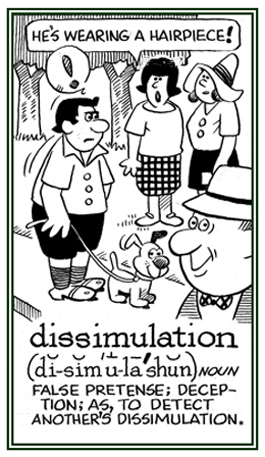
© ALL rights are reserved.
Go to this Word A Day Revisited Index
2. Etymology: from Old French, from Latin dissimulationem; from dissimulare, "to conceal, to disguise"; from dis-, "completely" + simulare, "to pretend, to simulate".

Go to this Word A Day Revisited Index
so you can see more of Mickey Bach's cartoons.
dissimulative (adjective), more dissimulative, most dissimulative
1. Concealing under a false appearance with the intent to deceive; such as, dissimulative arts.
2. Disguised as; for example, one's intentions which are expressed under a feigned appearance.
2. Disguised as; for example, one's intentions which are expressed under a feigned appearance.
dissipate (verb), dissipates; dissipated; dissipating
1. To drive away or to cause something to spread out and to disappear: The sun dissipated the winter darkness.
2. To separate into parts and to vanish or go away almost to the point of completely passing out of sight: The wind finally dissipated the smoke that came from the brush fires.
3. To spend or to use all of something wastefully or to squander: Chuck's cousin dissipated the fortune that he inherited from his father in just a few years.
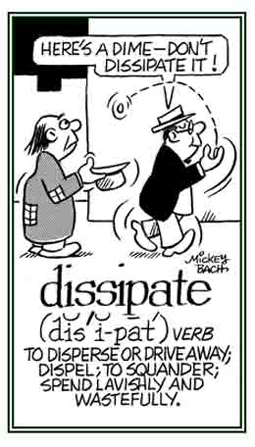
© ALL rights are reserved.
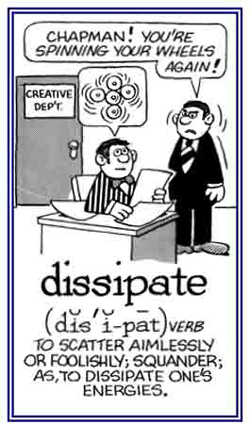
© ALL rights are reserved.
Go to this Word A Day Revisited Index
2. To separate into parts and to vanish or go away almost to the point of completely passing out of sight: The wind finally dissipated the smoke that came from the brush fires.
3. To spend or to use all of something wastefully or to squander: Chuck's cousin dissipated the fortune that he inherited from his father in just a few years.
The young men quickly dissipated their energy while they were running up the mountain in the winter.


Go to this Word A Day Revisited Index
so you can see more of Mickey Bach's cartoons.
dissipated (adjective), more dissipated, most dissipated
1. Pertaining to spending too much money and time on physical pleasures which are not good for one's health: Ben had a dissipated habit of eating too much unhealthy food and not exercising his body; both of which resulted in his becoming extremely overweight.
2. A reference to wasting or squandering money by playing games of chance: Jan's husband usually spent dissipated time at the local casino whenever he received his working salary before going home.
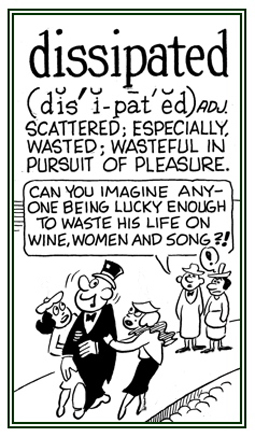
© ALL rights are reserved.
Go to this Word A Day Revisited Index
2. A reference to wasting or squandering money by playing games of chance: Jan's husband usually spent dissipated time at the local casino whenever he received his working salary before going home.

Go to this Word A Day Revisited Index
so you can see more of Mickey Bach's cartoons.
dissipatedly (adverb), more dissipatedly, most dissipatedly
Characteristic of indulging in an excessive pursuit of pleasure without restraint: "Jim's neighbor was dissipatedly wasting her money buying objects which she had stacked up on shelves and stored in boxes to such a degree that she could hardly walk from one room to another one."
A person or people who waste time or resources by not doing what they should: "Some school children are more often dissipaters than students striving to learn."
"There are often too many political dissipators spending national resources for their personal welfare instead of for the benefit of the people they represent."
1. The process of gradually disappearing or becoming less: "The new insulation of the house significantly stopped the dissipation of heat during the winter."
2. The act of using a great deal of money, time, or resources in a foolish way: "Jane's husband gambled away a fortune in an effort to acquire more money."
2. The act of using a great deal of money, time, or resources in a foolish way: "Jane's husband gambled away a fortune in an effort to acquire more money."
dissociate
1. To treat someone or something as distinct from or unconnected with someone or something else.
2. To cause the molecules of a compound to break down into simpler molecules, atoms, or ions; usually in a reversible reaction, or break down in this way.
3. To separate a group of mental processes from the rest of the mind, causing them to lose their usual relationship with it.
2. To cause the molecules of a compound to break down into simpler molecules, atoms, or ions; usually in a reversible reaction, or break down in this way.
3. To separate a group of mental processes from the rest of the mind, causing them to lose their usual relationship with it.
dissociation
1. A reference to the act of separating or the state of being separated.
2. In psychology and psychiatry, a perceived detachment of the mind from the emotional state or even from the body.
2. In psychology and psychiatry, a perceived detachment of the mind from the emotional state or even from the body.
Dissociation is characterized by a sense of the world as a dreamlike or unreal place and may be accompanied by poor memory of the specific events, which in severe form is known as dissociative amnesia.
dissociative
1. Characterized by the separation of whole segments of the personality (as in multiple personality disorder) or of discrete mental processes (as in schizophrenias) from the mainstream of consciousness or of behavior.
2. The property inherent in some biological stocks (as of certain bacteria) of differentiating into two or more distinct and relatively permanent strains.
3. The process by which a chemical combination breaks up into simpler constituents; especially : one that results from the action of energy (as heat) on a gas or of a solvent on a dissolved substance.
2. The property inherent in some biological stocks (as of certain bacteria) of differentiating into two or more distinct and relatively permanent strains.
3. The process by which a chemical combination breaks up into simpler constituents; especially : one that results from the action of energy (as heat) on a gas or of a solvent on a dissolved substance.
dissoluble
dissolute (adjective), more dissolute, most dissolute
A reference to spending too much time and money on physical pleasures in a way that many people consider immoral and physically harmful: Sam's uncle was a dissolute person who consumed liquor so much that he was almost always drunk.
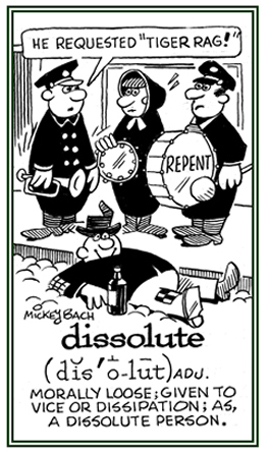
© ALL rights are reserved.
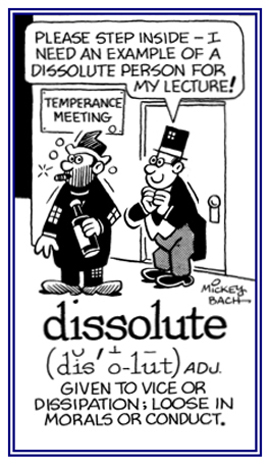
© ALL rights are reserved.
Go to this Word A Day Revisited Index


Go to this Word A Day Revisited Index
so you can see more of Mickey Bach's cartoons.
dissolutely
dissolution


